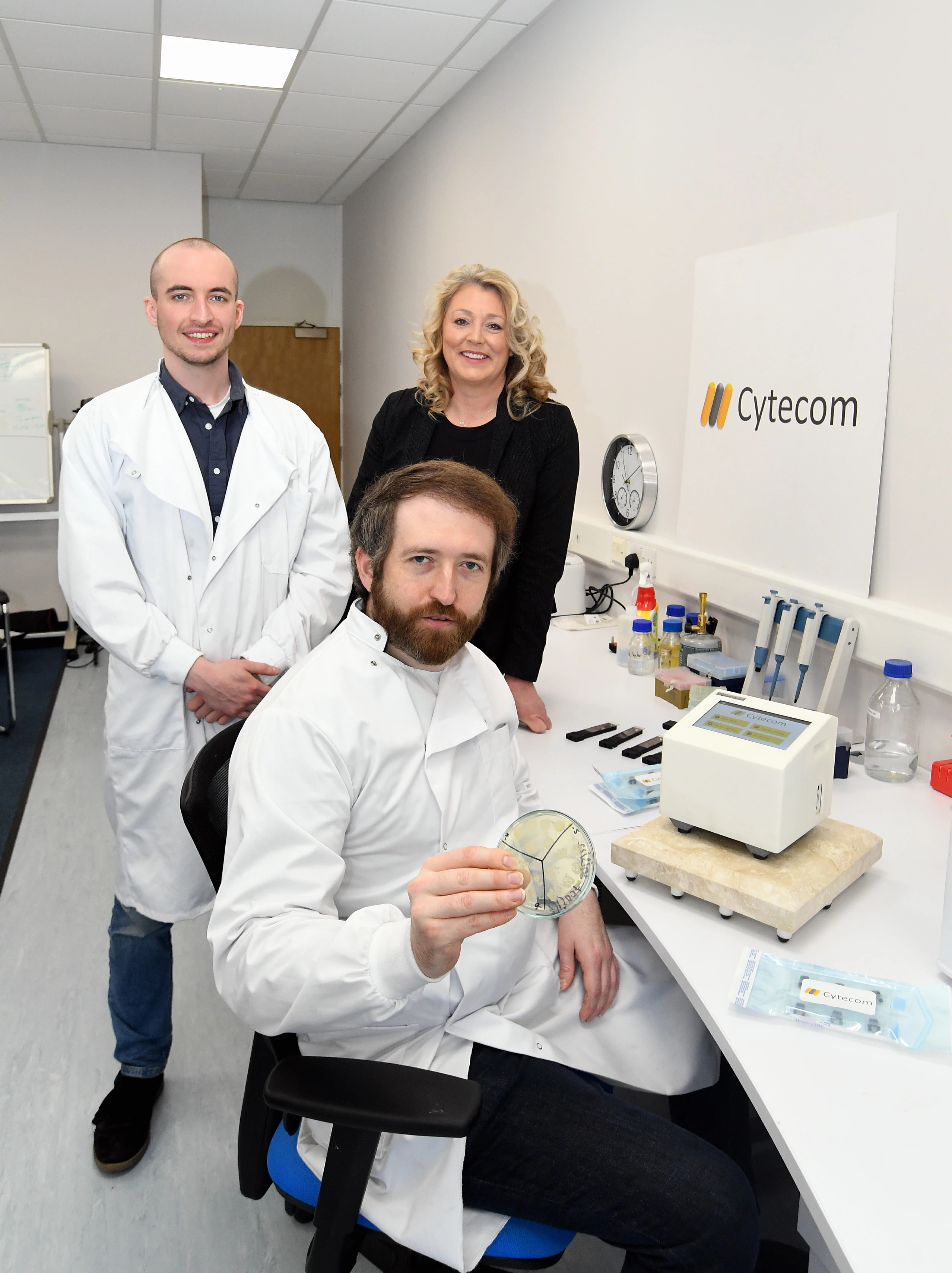
Partner Article
Coventry microbiology start-up set for rapid growth after novel bacteria-counting machine impresses industry
A Coventry microbiology start-up is set for rapid growth after discovering a valuable by-product of its cutting-edge equipment designed for the medical and microbiology industries.
Cytecom, based at The Venture Centre at the University of Warwick Science Park, has developed a novel machine that has reduced a two-day process of counting living bacteria into a simple procedure that takes just half an hour.
As the machine counts live microbes 50 times faster than traditional methods, it is already accelerating development of novel medical products and providing fascinating scientific insights.
The start-up, founded by James Stratford and Munehiro Asally of the University of Warwick, originally designed the equipment to manipulate bacteria but the new and unexpected use is proving attractive to the commercial market.
It is now set to grow its team from three to six people after successfully demonstrating the business case for its product and signing several deals in the past few months.
Cytecom, founded in 2018, was initially based in a small Ignite office designed to help boost start-ups at the Venture Centre, before steady growth and funding saw it move to a larger office within the centre in 2019, before a recent move to a large office and laboratory in 2022.
James, a former research fellow in Life Sciences at the University of Warwick, said: “Originally, we were trying to build a machine that could actually control bacteria through electrical impulses.
“Bacteria use electrical signals to communicate within a colony, so manipulation of these signals lent itself to controlling their metabolism.
“We thought this would be a useful invention for customers like antibiotic manufacturers, university labs, and probiotic companies, but we needed to get in front of them to see if there was a market for it.”
Business Ready, the Science Park’s business assistance programme and the University of Warwick (Warwick Innovations) helped Cytecom apply for the Innovation to Commercialisation of University Research (ICURe) programme, which funds companies for three months to travel and test if their products have a market.
And James realised it was an unintended function of Cytecom’s machine that would prove to be the most appealing.
He said: “When we approached our target market, it emerged none of them were particularly interested in controlling bacteria. However, one thing they were interested in is whether our machine could ‘count’ living bacteria.
“Happily, it could. When we send electrical signals into a sample of bacteria, any living ones respond with signals of their own. Our machine detects these signals and ‘counts’ the bacteria, which is crucial for our customers.
“It provides results in just 30 minutes, whereas using traditional methods can take up to a week for accurate results. So, while controlling bacteria remains an academic pursuit, our machine’s unintended function of counting the bacteria has proven to be lucrative for us.
“We are very grateful for the support of the Business Ready team and the Science Park for providing support and facilities, allowing us to scale up and deliver our novel invention from the lab to the marketplace.”
Cytecom has now secured contracts with a variety of Oxford-based microbiology firms, and is in advanced talks with a number of others.
Jane Talbot, Centre Manager at The Venture Centre, added: “We’re delighted to have supported James and the team alongside the Warwick Innovations team to help Cytecom make the transition from ‘experimental’ to ‘commercial’.
“In Cytecom’s case, it was a matter of the team listening to what potential customers had to say and altering its product accordingly. This might sound obvious but many start-ups do not do this.
“It’s fantastic that Cytecom’s clever invention now has a commercial foothold in the industry and is allowing the business to grow even more.”
This was posted in Bdaily's Members' News section by Matt Joyce .




 test article 123456789
test article 123456789
 hmcmh89cg45mh98-cg45hm89-
hmcmh89cg45mh98-cg45hm89-
 test456456456456456456
test456456456456456456
 test123123123123123123
test123123123123123123
 test xxxdiosphfjpodskhfiuodsh
test xxxdiosphfjpodskhfiuodsh
 Savour the flavour: North Tyneside Restaurant Week returns for 2024
Savour the flavour: North Tyneside Restaurant Week returns for 2024
 Six steps to finding the right buyer for your business
Six steps to finding the right buyer for your business
 Stephen signs off on a special night
Stephen signs off on a special night
 Life’s a Peachaus: Gillian Ridley Whittle
Life’s a Peachaus: Gillian Ridley Whittle
 Making a splash: Phil Groom
Making a splash: Phil Groom
 Making workplace wellbeing a priority
Making workplace wellbeing a priority
 A record of delivery, a promise of more: Ben Houchen
A record of delivery, a promise of more: Ben Houchen